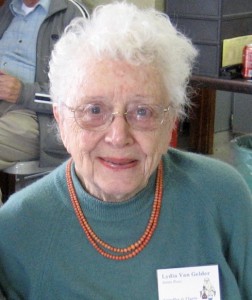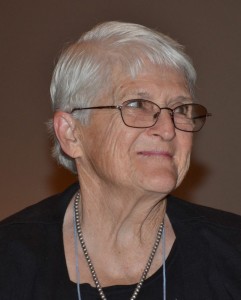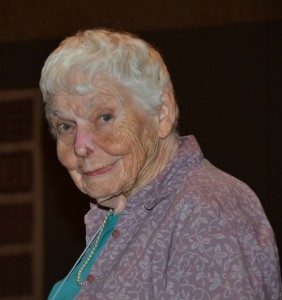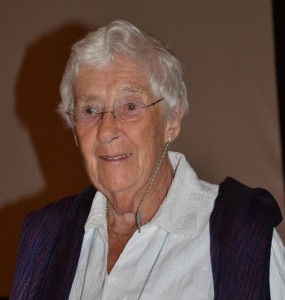Learning to make textiles by hand used to be a skill that was passed from one generation to another, usually by family members, but sometimes in an apprenticeship. Today, almost everyone has factory made clothing to wear, even those of us who pride ourselves in making something from scratch. In order to learn the skills necessary to spin fiber, warp and weave cloth or knit a garment, we seek other like minded people as mentors. How could we even begin to learn without these special individuals who share and teach us and what will happen if we stop passing on the skills to the younger generation?
It seemed most appropriate that at this year’s CNCH Conference, four women who have made a big difference in passing on their skill and knowledge to others were honored. The first was a memorial for Lydia van Gelder who passed away in December 2012 at 101 years of age. Lydia’s involvement in textiles and teaching were solidly in place before CNCH was founded, but she was an enthusiastic supporter of the new conference and managed to attend for many years wearing her handwoven and hand knit garments. She reached many students in classes, through her books on ikat dye techniques and also in her involvement with several local guilds. The tribute given to her at the 2013 conference was touching and heartwarming as many people raised their hands to signify that they had known Lydia personally. I found that CNCHnet had previously published a wonderful article about her and you may enjoy reading more details about this remarkable woman.
The next honoree is Alberta (Bert) Barrow. Bert had a full life and a career before she became absorbed in handmade textiles and baskets. When she and her husband settled in Auburn and were raising their family, Bert became active in 4-H with her children and the raising of sheep and goats. She still lives in Auburn on the Elegant Goat Ranch which has been the location for many workshops and informal spinning and weaving gatherings throughout the years. Bert, now an expert basket maker, has been sharing her knowledge with students for more than 20 years and has been an active participant in the yearly Open House that the Sacramento Guild hosts.
Frances Taylor is another very special person who helped a great many weavers get their start in her Sacramento studio. She taught classes and was a mentor to her apprentices; always with an eye to getting them to believe in what they could achieve if they just reached for it. At one point, Frances had a loom set up so that the teenagers in her neighborhood could come into her studio and weave. Through the years, Frances was always active in guild activities and the Sacramento Guild Open House. She is still attending conferences and hasn’t lost her curiosity and desire to learn something new. In fact, Frances had already signed up for the 2013 conference when she learned she was going to be invited as a special guest.
The last woman honored for her service to the weaving community was Hazel Ryland. Hazel actually started weaving as a child of 11 in her native England. When she came to this country, one of her first jobs was in a textile mill where she tied on new warps. Then she came to work for Custom Handweavers in Menlo Park and by 1970 she was teaching weaving classes on her own. Over the years, Hazel taught many people how to weave in her Carson City studio and was recognized by the Reno Fiber Guild for her contributions with a lifetime membership in that guild. Hazel’s advice for all weavers is “sample, sample, sample”! Of course this is said with a British accent and a mischievous sparkle in her eyes.
These are four women that have been recognized, but I imagine there are many more in our weaving communities; gently giving advice and leading the next generation into the world of weaving and spinning. As I wrote this article and thought about the four women and their contributions, it made me realize how many mentors I have had the good fortune to know. They have given me words of encouragement and perhaps a suggestion or two, which has made all the difference in my weaving life. May we all follow the example of these four women and allow ourselves to flower into teachers and mentors as well.



